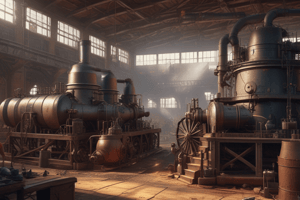Podcast
Questions and Answers
Explain the Bessemer process and its effect on the price of steel.
Explain the Bessemer process and its effect on the price of steel.
The Bessemer Process was the use of a blast of hot air to purify molten iron and converted it into steel. This made it easier to produce mass amounts of steel, so the price was low.
Explain the Transcontinental Railroad and its effects.
Explain the Transcontinental Railroad and its effects.
The Transcontinental Railroad was a railroad system that crossed the continental United States. It allowed for settlement in the west, provided jobs, promoted trade, boosted steel and train manufacturing due to demand for railcars and rails, and contributed to the growth of new towns and cities.
Where did the First Industrial Revolution begin and what did it involve?
Where did the First Industrial Revolution begin and what did it involve?
The first Industrial Revolution began in England, involving the transition from the power of animals and humans to steam and water power.
What changes led to the Second Industrial Revolution?
What changes led to the Second Industrial Revolution?
What was important about Anthony Lucas?
What was important about Anthony Lucas?
What state did the oil boom occur in and what were its consequences?
What state did the oil boom occur in and what were its consequences?
Define corporations and what were the advantages of this.
Define corporations and what were the advantages of this.
Explain what dividends are in relation to stockholders.
Explain what dividends are in relation to stockholders.
Define Laissez-faire capitalism and its effects on society.
Define Laissez-faire capitalism and its effects on society.
Define monopoly and its effects on society.
Define monopoly and its effects on society.
Define proprietorship and one benefit of this type of ownership.
Define proprietorship and one benefit of this type of ownership.
Define communism and list one country that exemplifies this economic system.
Define communism and list one country that exemplifies this economic system.
John D. Rockefeller was the tycoon of what industry?
John D. Rockefeller was the tycoon of what industry?
Andrew Carnegie was the tycoon of what industry?
Andrew Carnegie was the tycoon of what industry?
Frank Woolworth was responsible for introducing what type of store?
Frank Woolworth was responsible for introducing what type of store?
What is important about George Pullman?
What is important about George Pullman?
Explain the idea of the Gospel of Wealth and identify the individual who promoted this philosophy.
Explain the idea of the Gospel of Wealth and identify the individual who promoted this philosophy.
Define capitalism and identify which country is the leading capitalist of the world.
Define capitalism and identify which country is the leading capitalist of the world.
Define wildcatters.
Define wildcatters.
Flashcards are hidden until you start studying
Study Notes
Bessemer Process
- The Bessemer Process utilized a blast of hot air to purify molten iron, transforming it into steel.
- This innovation facilitated mass production of steel, significantly lowering its price.
Transcontinental Railroad
- The Transcontinental Railroad linked the eastern and western United States.
- It spurred westward settlement, created jobs, boosted trade, and increased demand for materials like steel.
- New towns arose and existing towns expanded into larger cities due to increased accessibility.
First Industrial Revolution
- Began in England, shifting from animal and human power to steam and water power.
- Marked a significant change in production methods and economic structure.
Second Industrial Revolution
- Sparked in the late 1800s by advancements in technology, including electrical power.
- Factories grew larger, producing an increased volume of goods.
- Improved transportation facilitated quicker movement of people and products.
Anthony Lucas and Spindletop
- Anthony Lucas discovered a significant oil reservoir at Spindletop Hill, Texas.
- The initial oil flow reached heights of 100 feet for nine days before being capped, marking an oil boom.
Texas Oil Boom
- The Texas oil boom began with the discovery of oil, producing over 17 million barrels by 1902.
- Major oil companies like Exxon Mobil, Gulf Oil, and Texaco emerged, leading to widespread use of gasoline and kerosene.
Corporations
- A corporation is a legal entity owned by stockholders, with distinct advantages.
- Corporations can raise capital through stock sales, provide limited liability to stockholders, and ensure continuity beyond single ownership.
Dividends
- Dividends are payments distributed to stockholders as a share of a corporation's profits.
Laissez-faire Capitalism
- Laissez-faire is a hands-off economic approach that can negatively impact consumers and workers through unchecked corporate power.
Monopoly
- A monopoly exists when a single corporation dominates a market, preventing competition.
- This can lead to higher prices and lower quality products for consumers.
Proprietorship
- A proprietorship is an ownership model where a single individual or family owns a business and retains all profits.
Communism
- Communism is a system where the government controls production and economic planning.
- North Korea exemplifies this economic model today.
Key Industrial Tycoons
- John D. Rockefeller was a dominant figure in the oil industry.
- Andrew Carnegie was a key player in the steel industry.
Frank Woolworth
- Frank Woolworth introduced the concept of 5 & 10 cent stores and pioneered chain retailing.
George Pullman
- Invented sleeping cars for the railroad and created Pullman, Illinois, as a company town for his workers, paying them in scripts usable only at company stores.
Gospel of Wealth
- Andrew Carnegie's Gospel of Wealth asserted that wealthy individuals have a moral obligation to donate wealth for the benefit of society.
Capitalism
- Capitalism is characterized by private ownership of industries and businesses.
- The United States is recognized as a leading capitalist nation.
Wildcatters
- Wildcatters were independent oil prospectors seeking to discover new oil fields.
Studying That Suits You
Use AI to generate personalized quizzes and flashcards to suit your learning preferences.




